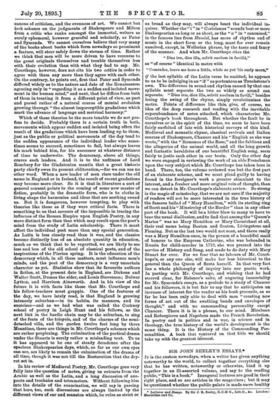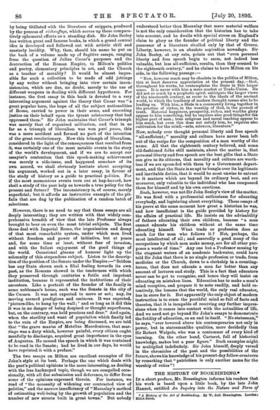SIR JOHN SEELEY'S ESSAYS.* Tr is the custom nowadays, when
a writer has given anything noteworthy to the world, to collect together everything else that he has written, noteworthy or otherwise, bind it up together in an ill-assorted volume, and say to the reading public," This is a book." Inaugural lectures are good in their right place, and so are articles in the magazines ; but it may be questioned whether the public palate is made reore healthy
• Lectures and Buoys. By Sir J. R. Seeley, K.0.1.1 G., Litt.D., &c. London: Macmillan and Co.
by being titillated with the literature of snippets, produced by the process of rgchaujfage, which serves up these compara- tively ephemeral efforts as a standing dish. Sir John Seeley has written great and famous books, in which a grand central idea is developed and followed out with artistic skill and masterly lucidity. Why, then, should his name be put on the back of a volume made up of fugitive essays, ranging from the question of Julius Ceesar's purposes and the destruction of the Roman Empire, to Milton's politics and poetry, elementary principles in art, and the Church as a teacher of morality ? It would be almost impos- sible for such a collection to be made of odd jottings by any writer without bringing into view certain incon- sistencies, which are due, no doubt, merely to the use of different weapons in dealing with different hypotheses. For instance, the first essay in this book is devoted to a very interesting argument against the theory that Cesar was "a great popular hero, the hope of all the subject nationalities of Rome, carried to power in their arms, and executing justice on their behalf upon the tyrant aristocracy that had oppressed them." Sir John maintains that Caesar's triumph was merely that of organised militarism, and that in so far as a triumph of liberalism was won pan i passu, this was a mere accident and formed no part of the intention of the great revolutionary. Now this triumph of liberalism, considered in the light of the consequences that resulted from it, was certainly one of the most notable events in the story of the world's development, and if we are to accept our essayist's contention that this epoch-making achievement was merely a side-issue, and happened somehow of its own accord, we shall obviously hesitate about accepting his argument, worked out in a later essay, in favour of the study of history as a guide to practical politics. For if the most momentous events turn out at hap-hazard, how shall a study of the past help us towards a true policy for the present and future? The inconsistency is, of course, merely superficial; but it affords an instructive example of the pit- falls that are dug by the publication of a random batch of selections.
However, there is no need to say that these essays are all deeply interesting ; they are written with that widely corn. prehensive breadth of view that the late Professor always brought to bear on even the most trivial subjects. The first three deal with Imperial Rome, the Organisation and decay of that most remarkable system, under which men lived without freedom and power of initiative, but at peace and, for some time at least, without fear of invasion, and with the fullest enjoyment of the good things of the world. Occasional gleams of humour light up the solemnity of this stupendous subject. Listen to the descrip- tion of the position of the Senate under the Empire :—" Seldom has any State shown such a filial feeling towards its own past, as the Romans showed in the tenderness with which they preserved through centuries a futile and impotent institution, because it represented the institutions of their ancestors. Like a ports ait of the founder of the family in some nobleman's house, such was the Senate in the city of the Cassars. It was not expected to move or act; nay, its moving seemed prodigious and ominous. It was expected, 'picture-like, to hang by the wall;' and so long as it did this it was in no danger of being despised or thought superfluous, but, on the contrary, was held precious and dear." And again, when the sterility and want of population which finally led to the ruin of the Empire, are being discussed, we are told that "the grave maxim of Metellus Macedonians, that mar- riage was a duty which, however painful, every citizen ought inanf ally to discharge, acquired great importance in the eyes of Augustus. He caused the speech in which it was contained to be read in the Senate; had he lived in our days, he would have reprinted it with a preface."
The two essays on Milton are excellent examples of Sir John's style at its best. Perhaps the one which deals with the poet's political opinions is the more interesting, as dealing with the less hackneyed topic, though we are compelled occa- sionally, with all due submission and deference, to differ from some of the opinions expressed therein. For instance, we read of 'the necessity of widening our contracted view of politics," and the narrow insufficiency of "Macaulay's method of estimating well-being by the growth of population and the number of new streets built in great towns." But nobody understood better than Macaulay that mere material welfare is not the only consideration that the historian has to take into account, and he dwells with special stress on England's claim to glory as the founder of political liberty and the possessor of a literature rivalled only by that of Greece. Liberty, however, is an obsolete aspiration nowadays. Sir John Seeley, at any rate, points out that "even personal liberty and free speech begin to seem, not indeed less valuable, but less all-sufficient, results, than they seemed to the eighteenth century," and he claims to have Milton on his side, in the following passage :—
"Now, however much may be obsolete in the politics of Milton, this at least deserves appreciation at the present day,—that, throughout his works, he contemplates the State in this larger sense. It is never with him a mere market or Trade-Union. lie did not so much by a prophetic spirit anticipate the larger views of the nineteenth century, as recur to the ideals of the ancient world, to which the tendency of modern thought seems also to be leading us. With him, a State is a community living together in the practice of virtue, in the worship of God, in the pursuit of truth. Material happiness, prosperity, riches, and warlike glory appear to him something, but he requires also good things for the higher part of men ; true religious and moral teaching appear to him much, but even this does not satisfy him, he requires also cultivation for the mind,—arts, sciences, literature."
Now, nobody ever thought personal liberty and free speech " all-sufficient; " morality and culture have never been left out of the recipe for the composition of a man worthy of the name. All that the eighteenth century believed, and some old-fashioned folks still maintain, about the matter is, that personal liberty and free speech are the best gifts that a State can give to its citizens, that morality and culture are worth- less if we are spoon-fed with them by a Government depart- ment, and that the State is so apt to bungle over its legitimate and inevitable duties, that it would be most unwise to entrust to it matters which are beyond its ordinary beat, and are moreover, only valuable to the individual who has compassed them for himself and by his own exertions.
Such, however, was not Sir John Seeley's view of the matter.
He was fired with a professorial enthusiasm for educating everybody, and legislating about everything. These essays of his prove at the same moment how great a historian he was, and how insufficient is the guide provided by history for the affairs of practical life. He insists on the advisability of fathers educating their own children, because "a man cannot educate his children without at the same time educating himself. What trade or profession does as much for the man who follows it ? Not, perhaps, the most intellectual of all ; and assuredly a good many of the occupations by which men make money, are for all other pur- poses a waste of time." Any one but a Professor musing by the stagnant waters of an academic backwater, could have told Sir John that there is no single profession or trade, from medicine or the Church, down to a clerkship in a counting- house, that does not educate a man far better than any amount of lectures and study. This is a fact that educators never can be got to recognise, and hence they will insist on educating on mistaken lines. Education has to make a man's mind receptive, and prepare it to note readily, and hold re- tentively, the lessons that the world, the only real educator, has in store for it. But apparently the only object of modern instruction is to cram the youthful mind so full of facts and theories, that it is incapable of receiving any further impres- sions when it comes into contact with the actualities of life.
And we need not go beyond Sir John's essays to demonstrate the futility of education, as an end in itself. "No statesman," he says, "ever towered above his contemporaries not only in power, but in statesmanlike qualities, more decidedly than Sir Robert Walpole, who was a contemner of every kind of learning. On the other hand, Carteret, full of historical knowledge, makes but a poor figure." Such examples might be multiplied indefinitely. Sir John himself, deeply versed in the chronicles of the past and the possibilities of the future, shows his knowledge of his present-day fellow-creatures by remarking that "patriotism is only another name for the worship of relics"!



































 Previous page
Previous page